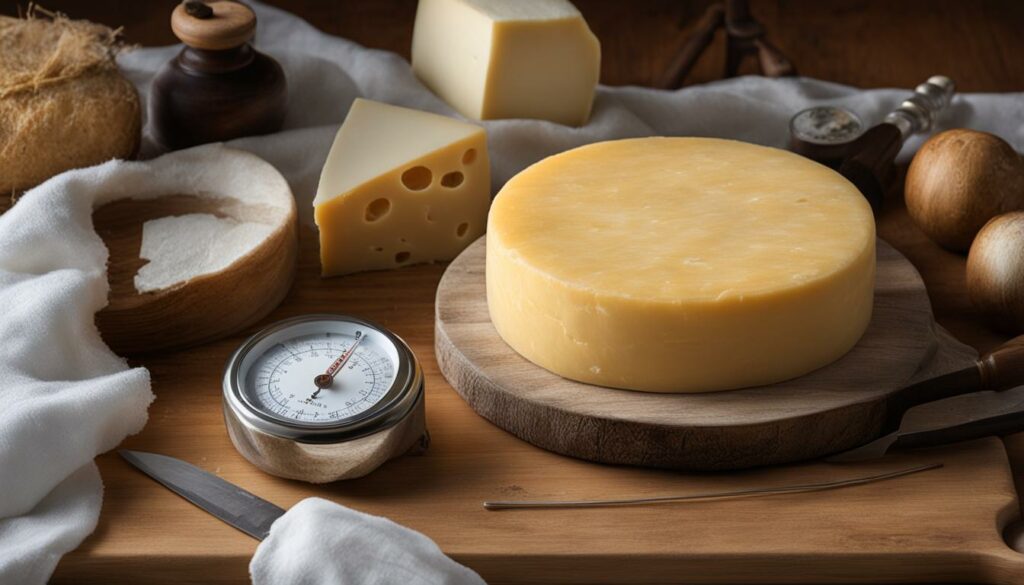Welcome to the world of Dessertnyj Belyj Cheese, a Russian delicacy that will take your desserts to a whole new level. This luscious white cheese is the perfect addition to your sweet creations, adding a creamy and indulgent touch. Made from high-quality dairy products, Dessertnyj Belyj Cheese has a rich flavor profile that will impress even the most discerning cheese lovers.
Whether you’re a cheesecake connoisseur or an ice cream enthusiast, Dessertnyj Belyj Cheese will elevate your desserts with its smooth and velvety texture. Its creamy consistency makes it easy to work with, allowing you to experiment and create unique cheese desserts that will wow your friends and family.
Discover the world of Dessertnyj Belyj Cheese and unlock a realm of delicious possibilities. From cheesecakes to pastries, this Russian cheese has the power to transform your desserts into extraordinary culinary masterpieces. So, unleash your creativity and indulge in the creamy delight of Dessertnyj Belyj Cheese.
The Ban on Imported Cheese in Russia
In Russia, the import of Western cheese has been banned for several years. This ban was put in place as a response to Western sanctions imposed on Russia in 2014. The Russian government aimed to promote domestic production and reduce dependence on foreign goods. As a result, certain types of cheese, including Italian parmesan, Dutch Gouda, and British Cheddar, are not legally available for import in Russia. However, Russia produces its own range of cheese, including Adyghe cheese, which is made from cow’s, goat’s, or sheep’s milk. This soft cheese is popular within the country and is used in cooking and as a snack.

“The ban on imported cheese has given rise to a thriving domestic cheese industry in Russia.” – Ivan Petrov, Russian Cheese Manufacturer
The ban on imported cheese has had significant implications for the Russian cheese market. On one hand, it has stimulated the growth of the domestic industry, leading to an increase in the production of Russian cheese. This has not only created more job opportunities but has also allowed for the development of unique and diverse cheese varieties.
On the other hand, the ban has limited consumer access to popular types of Western cheese. Russian cheese lovers have had to explore alternatives and discover the rich flavors of local cheeses. The demand for Russian dairy products, such as creamy cheese suitable for desserts, has risen, and the industry has responded by offering a wide range of options to cater to different tastes and preferences.
The ban on imported cheese in Russia has not only driven the growth of the domestic cheese industry but has also resulted in a greater appreciation for Russian dairy products. It has encouraged consumers to explore the variety and quality of Russian-made cheeses, allowing them to experience the unique flavors and textures that these cheeses offer. While certain types of cheese are restricted, the ban has sparked a renaissance in the Russian cheese market, making it an exciting time for both producers and cheese enthusiasts.
| Type of Cheese | Import Status |
|---|---|
| Italian Parmesan | Banned |
| Dutch Gouda | Banned |
| British Cheddar | Banned |
| Adyghe Cheese | Locally Produced |
As shown in the table above, Italian Parmesan, Dutch Gouda, and British Cheddar are among the types of imported cheese that are now banned in Russia. These restrictions have led to a rise in the popularity of locally produced cheeses, such as Adyghe cheese. Made from cow’s, goat’s, or sheep’s milk, Adyghe cheese offers a creamy texture and a distinct flavor that has won the hearts of many cheese lovers in Russia.
Motivations for Russia’s Restrictive Measures on Cheese
The ban on cheese imports in Russia is motivated by several factors. Firstly, it aims to protect the domestic market and support locally produced cheeses. By limiting the competition from foreign cheeses, the government intends to promote the growth of the Russian cheese industry. This ensures that high-quality Russian cheese varieties, such as Dessertnyj Belyj Cheese, have a prominent place in the market.
Secondly, the ban can be seen as a response to political tensions with Western countries. The conflict, which sparked the imposition of sanctions, has necessitated retaliatory measures. One such measure is the ban on cheese imports from these countries. This not only serves as a political statement but also allows Russia to strengthen its self-sufficiency in cheese production and reduce dependence on other nations.
Lastly, the ban is part of a broader goal of ensuring food security for the country. By reducing reliance on imported goods, especially when it comes to essential food items like cheese, Russia aims to maintain stability and control over its food supply. Supporting the local dairy industry and promoting the production of high-quality dairy cheese, both white and creamy, plays a significant role in achieving this objective.
“The ban on foreign cheese imports not only protects the local market and supports domestic cheese producers, but it also sends a message of self-reliance and sovereignty amidst political tensions.” – Russian Ministry of Agriculture
In conclusion, the ban on cheese imports in Russia serves multiple purposes. It protects and promotes the domestic cheese industry, retaliates against political tensions, and ensures food security for the country. By understanding these motivations, we can gain insight into the significance of Russian cheese, explore diverse cheese dessert options, and appreciate the efforts made to bolster the local dairy industry.

Enforcement and Crackdown on Illegal Cheese in Russia
The Russian government has taken strict measures to enforce the ban on illegal import and production of cheese. Various methods have been implemented to tackle this issue, including:
- Border checks and inspections
- Surveillance and undercover operations
- Cooperation with international organizations
- Stiff penalties for offenders
These enforcement efforts have been instrumental in busting several illegal cheese operations, highlighting the government’s determination to eliminate the illicit cheese trade.
Let’s take a closer look at the impacts of these measures:
Boost to the Domestic Cheese Industry
The crackdown on illegal cheese has led to a significant boost in the domestic cheese industry. With restrictions on imported cheese, local producers have seized the opportunity to meet consumer demands for Russian cheese, including creamy varieties suitable for cheese desserts.
The increased demand for domestic cheese has resulted in higher investments and job creation within the industry, driving economic growth.
Higher Prices for Imported Cheese
On the flip side, the enforcement measures have also led to higher prices for imported cheeses. Limited availability of foreign cheese has created a situation where supply cannot meet the demand, thus driving up the prices.
While this may pose challenges for consumers who enjoy a wide variety of cheese options, it has encouraged them to explore alternatives and support local cheese producers.
| Impacts | Description |
|---|---|
| Boost to the Domestic Cheese Industry | Increase in investments and job creation within the industry. |
| Higher Prices for Imported Cheese | Limited availability resulting in increased prices for imported cheeses. |
This table summarizes the impacts of the enforcement and crackdown on illegal cheese in Russia.
Comparison with Other Food Import Restrictions in Russia
The ban on cheese imports in Russia is just one of many food import restrictions imposed by the country. Other similar measures include bans on meat, fruit, vegetables, and seafood imports. These restrictions reflect Russia’s broader goals of promoting self-sufficiency, protecting domestic industries, and ensuring food security.
While the ban on cheese imports has strained Russia’s trade relations with Western countries, it has also created opportunities for domestic producers and diversified the cheese market in Russia.
| Food Category | Import Restrictions |
|---|---|
| Meat | Bans on imported beef, pork, and poultry |
| Fruit | Restrictions on imported apples, oranges, and grapes |
| Vegetables | Bans on imported tomatoes, cucumbers, and potatoes |
| Seafood | Import restrictions on salmon, shrimp, and cod |
The ban on cheese imports is part of a larger strategy to reduce reliance on foreign goods and stimulate domestic production. While it has impacted trade relationships, it has also encouraged innovation and investment in the Russian cheese industry.

Key Takeaways:
- Russia has implemented various food import restrictions, including a ban on cheese imports, to promote self-sufficiency and protect domestic industries.
- The ban on cheese imports has led to opportunities for Russian cheese producers and diversified the cheese market in the country.
- Similar import restrictions exist for meat, fruit, vegetables, and seafood, reflecting Russia’s broader goals of ensuring food security.
Impact on Local Producers and Consumers
The ban on cheese imports and the enforcement measures employed by Russian authorities have had significant impacts on local cheese producers and consumers. On one hand, the ban has created opportunities for domestic cheese producers to expand their market share, leading to increased investment and job creation in the industry.
Local producers have been able to capitalize on the ban by providing consumers with a wide range of Russian cheeses, including the popular creamy and indulgent varieties. With the absence of imported competition, these producers have gained a competitive edge and are enjoying increased demand for their products.
“The ban on cheese imports has given us a chance to showcase the quality and taste of our Russian cheeses. We have invested in modernizing our facilities and expanding our production capacity to meet the growing demand,” says Ivan Petrov, owner of a local dairy farm.
On the other hand, the ban has resulted in higher prices for imported cheeses, making them less accessible to average consumers. Imported creamy cheeses that were once readily available in Russian markets have become more expensive due to the limited supply. As a result, consumers have had to explore alternative options.
Many consumers have turned to cheeses from other countries that are not affected by the ban. They have discovered new flavors and textures, expanding their culinary experiences. In addition, consumers have also embraced locally produced cheeses, appreciating their freshness and connection to Russian culinary traditions.
The Impact on Local Producers
The ban on cheese imports has been a boon for local producers, allowing them to thrive and gain recognition for their quality products. Here is a breakdown of the impact on local producers:
| Impact | Description |
|---|---|
| Increased Market Share | Local cheese producers have experienced a surge in market share as imported cheeses have become less available. They have been able to capture a larger portion of the cheese market in Russia. |
| Investment and Expansion | The ban has prompted local producers to invest in their facilities and expand their production capacity. This has led to the creation of new jobs and the modernization of the industry. |
| Growth in Cheese Varieties | The ban has encouraged local producers to innovate and create new cheese varieties to cater to the evolving tastes of consumers. This has resulted in a diverse range of creamy, indulgent cheeses available on the market. |
The Impact on Consumers
The ban on cheese imports has had both positive and negative effects on consumers. Here are the key impacts:
| Impact | Description |
|---|---|
| Higher Prices | Imported cheeses have become more expensive due to the limited supply, making them less accessible to average consumers. This has led to a shift in consumer preferences towards more affordable options. |
| Exploring New Flavors | Consumers have turned to cheeses from other countries not affected by the ban, expanding their palate and discovering new flavors and textures. |
| Embracing Local Products | The ban has prompted consumers to explore the wide range of locally produced cheeses and appreciate their freshness and connection to Russian culinary traditions. |
Overall, the ban on cheese imports in Russia has reshaped the cheese market, providing opportunities for local producers while influencing consumer choices. The industry has witnessed growth and innovation, with a focus on creamy, indulgent cheeses that cater to the evolving preferences of consumers. As a result, Russian cheese lovers have a variety of options to indulge in, fostering a vibrant and thriving cheese culture within the country.

Conclusion
In conclusion, Dessertnyj Belyj Cheese offers a unique and indulgent option for creating delicious desserts. This luscious Russian white cheese, known for its creamy texture and rich flavor, is the perfect ingredient to elevate your dessert creations. While imported cheese is banned in Russia, the country has a thriving domestic cheese industry that produces a variety of creamy cheeses, including Dessertnyj Belyj Cheese.
The ban on imported cheese has led to strict enforcement measures and crackdowns on illegal cheese operations in Russia. The government aims to protect the domestic market and promote the growth of the Russian cheese industry. Despite these restrictions, cheese enthusiasts have found ways to satisfy their cravings by exploring alternative sources, such as cheeses from other countries not affected by the ban or locally produced cheeses.
The ban on imported cheese has also created opportunities for local cheese producers to expand their market share. This has led to increased investment and job creation in the domestic cheese industry. So, dive into the world of Dessertnyj Belyj Cheese and unleash your creativity in making delightful cheese desserts. With its creamy texture and rich flavor, this cheese is sure to delight your taste buds and elevate your dessert experience.
FAQ
What is Dessertnyj Belyj Cheese?
Dessertnyj Belyj Cheese is a luscious Russian white cheese that is perfect for creating unique and indulgent desserts. Made from high-quality dairy products, this soft cheese has a creamy texture and a rich flavor profile.
How can I use Dessertnyj Belyj Cheese in desserts?
Dessertnyj Belyj Cheese can be used in a variety of sweet dishes, including cheesecakes, pastries, and ice creams. Its smooth and velvety consistency adds a luxurious touch to any dessert creation.
Why is there a ban on imported cheese in Russia?
The ban on imported cheese in Russia was put in place as a response to Western sanctions imposed on Russia in 2014. The Russian government aims to promote domestic production and reduce dependence on foreign goods, including cheese.
What are the motivations for Russia’s restrictive measures on cheese?
The ban on imported cheese in Russia aims to protect the domestic market and support locally produced cheeses. It is also seen as a response to political tensions with Western countries and a broader goal of ensuring food security by reducing reliance on imported goods.
How does Russia enforce the ban on illegal cheese?
The Russian government has implemented various methods of enforcement, including border checks and inspections, surveillance and undercover operations, cooperation with international organizations, and stiff penalties for offenders.
Are there other food import restrictions in Russia?
Yes, besides the ban on cheese imports, Russia has also imposed restrictions on meat, fruit, vegetables, and seafood imports. These measures reflect the country’s goals of promoting self-sufficiency, protecting domestic industries, and ensuring food security.
What is the impact of the ban on local producers and consumers?
The ban on imported cheese has created opportunities for domestic cheese producers to expand their market share, leading to increased investment and job creation. However, it has also resulted in higher prices for imported cheeses, making them less accessible to average consumers. Consumers have turned to alternative sources, such as cheeses from other unaffected countries or locally produced cheeses.







